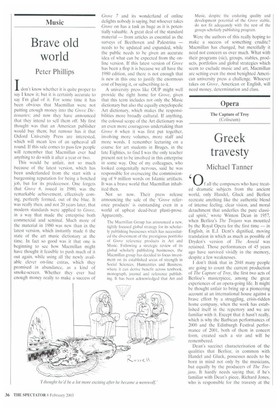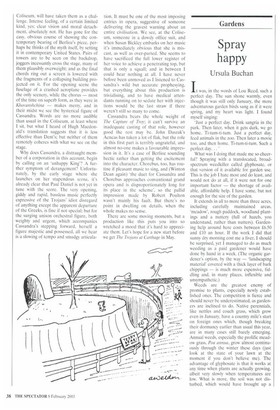The Capture of Troy (Coliseum)
Greek travesty
Michael Tanner
Of all the composers who have treated dramatic subjects from the ancient world, only Handel, Gluck and Berlioz recreate anything like the authentic blend of intense feeling, clear vision, and moral detachment that underlies the pure classical spirit,' wrote Winton Dean in 1957, when Berlioz's The Trojans was mounted by the Royal Opera for the first time — in English, in E.J. Dent's dignified, moving translation in which as much as possible of Dryden's version of The Aeneid was retained. Those performances of 45 years ago have survived vividly in the memory, despite a few weaknesses.
I don't think that in 2048 many people are going to count the current production of The Capture of Troy, the first two acts of Berlioz's masterpiece, among the great experiences of an opera-going life. It might be thought unfair to bring up a pioneering account at an international house against a brave effort by a struggling, crisis-ridden home company, when the work has established itself in the repertory and we are familiar with it. Except that it hasn't really, which is why the Barbican performances of 2000 and the Edinburgh Festival performance of 2001, both of them in concert form, created such a stir and will be remembered.
Dean's succinct characterisation of the qualities that Berlioz, in common with Handel and Gluck, possesses needs to be born in mind not only by the musicians, but equally by the producers of The Trojans. It hardly needs saying that, if he's familiar with Dean's piece, Richard Jones, who is responsible for the travesty at the
Coliseum, will have taken them as a challenge. Intense feeling, of a certain limited kind, yes: clear vision and moral detachment, absolutely not. He has gone for the easy, obvious course of showing the contemporary bearing of Berlioz's piece, perhaps he thinks of the myth itself, by setting it in contemporary United States. Pairs of towers are to be seen on the backdrop, joggers incessantly cross the stage, many of them plausibly overweight; and as the final chords ring out a screen is lowered with the fragments of a collapsing building projected on it. For the opening scene the fuselage of a crashed aeroplane provides the only scenery, while the chorus — most of the time on superb form, as they were in Khovanshchina — makes merry, and in their midst we see the hysterical figure of Cassandra. Words are no more audible than usual in the Coliseum, at least where I sit. but what I heard of Hugh Macdonald's translation suggests that it is less effective than Dent's; but neither of them remotely coheres with what we see on the stage.
Why does Cassandra, a distraught member of a corporation in this account, begin by calling on an 'unhappy King'? A further symptom of derangement? Unfortunately, by the early stage where she launches on her stupendous scena, it's already clear that Paul Daniel is not yet in tune with the score. The very opening, giddy and rapid, bassless music perfectly expressive of the Trojans' idiot disregard of anything except the apparent departure of the Greeks, is fine if not special; but for the surging unison orchestral figure, both weighty and urgent, which accompanies Cassandra's stepping forward, herself a figure majestic and possessed, all we hear is a slowing of tempo and smudgy articula
tion. It must be one of the most imposing entries in opera, suggestive of someone delivering the gravest warning about an entire civilisation. We see, at the Coliseum, someone in a dowdy office suit, and when Susan Bickley embarks on her music it's immediately obvious that she is miscast, as well as over-parted. She seems to have sacrificed the full lower register of her voice to achieve a penetrating top, but that is only a squall; and in between I could hear nothing at all. I have never before been unmoved as I listened to Cassandra's wild but accurate prophesying, but everything about this production is trivialising, and to have medical attendants running on to sedate her with injections would be the last straw if there weren't still so many to come.
Cassandra bears the whole weight of The Capture of Troy; it can't survive an inadequate casting of that role, however good the rest may be. John Daszak's Aeneas has taken a lot of flak, but the role in this first part is terribly ungrateful, and almost no-one makes a favourable impression in it. Its a case of Berlioz sounding hectic rather than getting the excitement into the character. Chorebus, too, has routine if pleasant music to sing, and (Winton Dean again) 'the duet for Cassandra and Chorebus approaches conventional grand opera and is disproportionately long for its place in the scheme', so the pallid impression made by Robert Poulton wasn't mainly his fault. But there's no point in dwelling on details, when the whole makes no sense.
There are some moving moments, but a production like this puts you into so wretched a mood that it's hard to appreciate them. Let's hope for a new start before we get The Trojans at Carthage in May.



























































 Previous page
Previous page